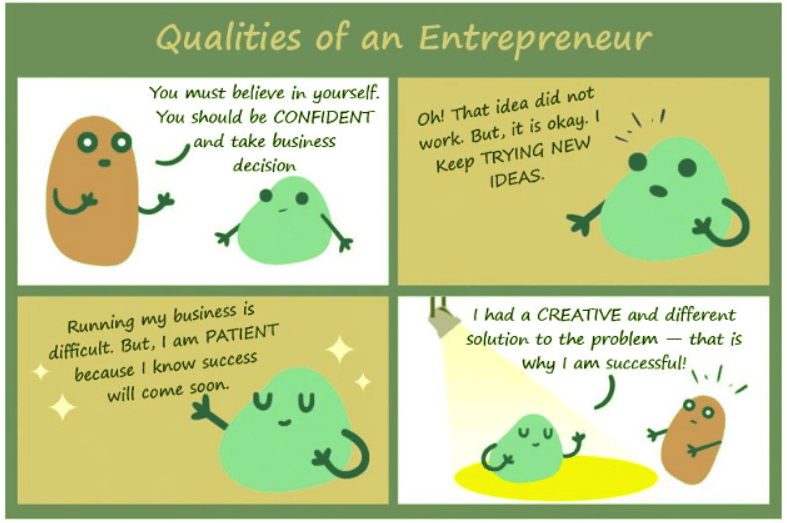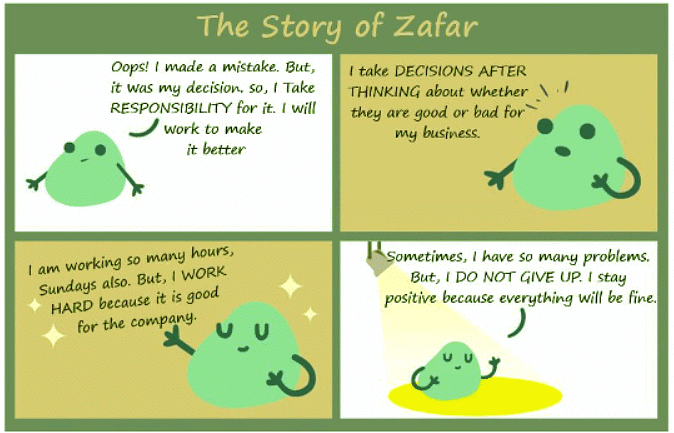Entrepreneurial Skills - Class 10 PDF Download
| Table of contents |

|
| Introduction |

|
| Entrepreneurship and Society |

|
| Qualities and Functions of an Entrepreneur |

|
| Myths About Entrepreneurship |

|
Introduction
Entrepreneurship is a widely discussed topic globally, particularly in India. It involves self-employment where individuals run businesses to meet people's needs while constantly seeking improvements to increase profits. This unit aims to inspire students to explore entrepreneurship and its functions by observing the world around them. Entrepreneurs are everywhere, and we have likely interacted with many during this course.
We've also learned that successful entrepreneurs share several key qualities:
- They have confidence and believe in themselves and their abilities.
- They continuously experiment with new ideas in their business.
- They exhibit patience.
- They are creative and approach business ideas differently.
- They take responsibility for their actions.
- They make well-considered decisions.
- They are hardworking.
- They persist in the face of challenges and do not give up easily.
Entrepreneurship and Society
- Last year, we learned that people can earn a living through wage employment or self-employment. Wage-employed individuals work for someone else or an organization and receive payment for their work. In contrast, self-employed individuals start businesses to meet people's needs. A self-employed person who constantly strives to improve their business by taking risks and trying new ideas is known as an entrepreneur.
- For example, Ramya and Ramu both own plant shops. Ramu stays at his shop daily and sells to customers who come to him. Ramya, on the other hand, actively seeks customers, sells seeds and flowers along with plants, and works to expand her business. Ramya, with her innovative approach and efforts to grow her business, is an entrepreneur, while Ramu is simply a businessman.
- We've identified entrepreneurs around us and noted that they operate their businesses in markets. Markets consist of buyers and sellers engaging in transactions, which benefits everyone involved as it generates income for all parties. Entrepreneurs play a crucial role in developing their communities and society at large.
- For instance, Aditi runs a store selling various shampoos. She has numerous customers and buys shampoos in bulk from a supplier. Two employees help her sell the products. By doing this, Aditi creates job opportunities and helps people in her community earn money, thereby contributing to the overall well-being of society.
- So, what exactly do entrepreneurs do when they run their businesses? They innovate, take risks, create jobs, and contribute to the economic growth of their communities.

Meeting Customer Needs
- Demand refers to the products or services that people desire.
- Entrepreneurs identify these needs and use their creativity to develop business ideas that satisfy this demand.
Utilizing Local Resources
- Entrepreneurs leverage the materials and people available in their surroundings to produce goods at a low cost.
Benefiting Society
Entrepreneurs maintain a positive relationship with society by making profits through activities that benefit the community. Some focus on environmental conservation, while others donate to build schools and hospitals, improving the surrounding area.
These are some roles entrepreneurs play in society. How do entrepreneurs impact their communities?
Let's explore:
- Creating Jobs: As businesses grow, entrepreneurs need more people to assist them. They purchase more materials and hire more employees, creating job opportunities.
- Wealth Distribution: Wealth is having enough money to live comfortably. As entrepreneurs expand their businesses, their employees and associated businesses also prosper, enabling them to enjoy a better quality of life.
- Reducing Product Prices: When more entrepreneurs enter the market with the same product, prices tend to decrease. For instance, as more mobile phones were sold in India, their prices dropped.
- Let’s understand the role of entrepreneurs in society through Bharti’s story:
- Bharti, the Jewellery Queen: Bharti is a young woman from Bihar. Many girls in her area love wearing earrings. She buys jute from a farmer and makes earrings, selling them under her business, Manavi Natural Handicrafts. Observing that most women in her village are unemployed, she hires two women to help her. As her orders grow, she buys more jute and hires three more women. Now, the farmer and the women working for her earn more money and can save for their future.
Qualities and Functions of an Entrepreneur
In the previous section, we learned how entrepreneurs contribute to the growth of their communities. To positively impact society, what are the ways they think and act?
Qualities of an Entrepreneur
A quality refers to a specific way a person acts or behaves. Examples of qualities in people include being hardworking, kind, or rude. By reading the comic strips in Figures below, you can discover the qualities that characterize an entrepreneur.

Myths About Entrepreneurship
- We know that entrepreneurs are everywhere. However, how many of us aspire to be entrepreneurs? We often associate entrepreneurship with various thoughts and opinions. Some believe that being an entrepreneur is easy, while others think it's difficult. There are also those who feel they aren't cut out for entrepreneurship.
- A myth, or a misconception, is a false belief or opinion about something. For example, believing that tall people run faster than short people is a misconception. The truth is that short people can also run fast.
Similarly, here are some common misconceptions about entrepreneurship, along with the actual truths:
Misconception 1: The misconception is that every business idea needs to be unique or special.
- The businesses mentioned earlier are common and familiar. However, each entrepreneur recognized customer demand and introduced a new idea into their business. An individual can take an existing market idea and innovate upon it.
- Ganesh is an entrepreneur who started a car rental business. To differentiate himself from other car rental businesses, he came up with the idea of adding luxury cars like Mercedes and BMW to his fleet. After 10 years in the business, he now owns 200 cars, including 75 luxury cars.
Misconception 2: The misconception we have is that a person needs a lot of money to start a business.
- The money used to start a business is called capital, which is crucial for launching any business. However, not every business requires a large amount of capital to get started. In our examples, each entrepreneur began with varying amounts of money—some with substantial funds and others with minimal amounts. Yet, they all found success.
- Depending on your available funds or the amount you can borrow, you can initiate a business with whatever capital you have. As you earn more money, you can reinvest it into your business to help it grow.
Misconception 3: A misconception we have is that only a person having a big business is an entrepreneur.
- Sheila is 35 years old and has a passion for driving. She worked diligently for five years and managed to buy a taxi. Wanting to stand out from other taxi drivers in the city, Sheila implemented several unique features. She greeted her customers with a friendly "hello," provided that day’s newspaper in her car for them to read, and installed a small TV with various channels for entertainment. Additionally, she put up a board with contact numbers for nearby hospitals and hotels. Due to these thoughtful additions, customers lined up to ride in her exceptional taxi!
- After reading Sheila’s story, fill out Table below:

- Many might not label Sheila as an entrepreneur simply because she ran a taxi business. However, she was self-employed, attentive to her customers' needs, and continually improving her service. According to our definition, she is indeed an entrepreneur. No business is too small or insignificant. If someone is operating a business to meet customer needs, they are an entrepreneur. Most businesses start small and grow with dedication and creativity.
Misconception 4: A misconception we have is that entrepreneurs are born, not made.
- Before we continue, ask yourself this question: Do you think you can be an entrepreneur? Answer with yes or no.
- We often think that only certain people have the talent for running a business. However, an entrepreneur is simply someone who does whatever it takes to make their business successful. In the previous activity, you did everything possible to sell your product, which means you are already an entrepreneur!
- Becoming an entrepreneur starts with a mindset. You need to believe that anything is possible and achievable. It begins with coming up with an idea and then finding a way to make it unique.
- We have debunked four common misconceptions about entrepreneurship.
FAQs on Entrepreneurial Skills - Class 10
| 1. What is the importance of entrepreneurship in society? |  |
| 2. What are the key qualities of a successful entrepreneur? |  |
| 3. What are some common myths about entrepreneurship? |  |
| 4. What essential skills do entrepreneurs need to succeed? |  |
| 5. How does entrepreneurship contribute to job creation? |  |














